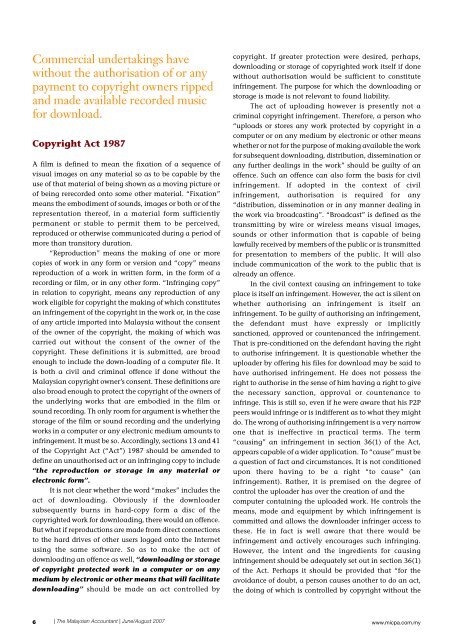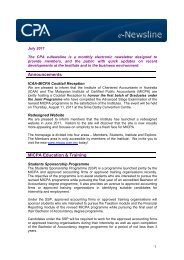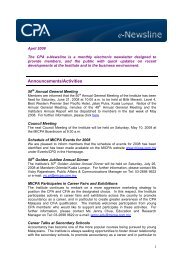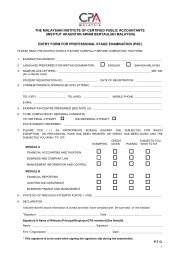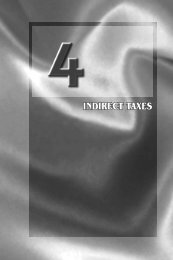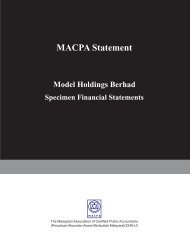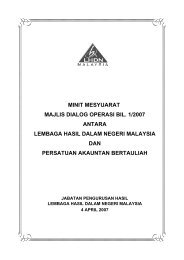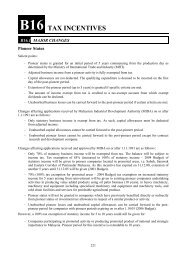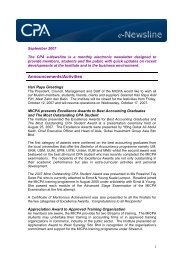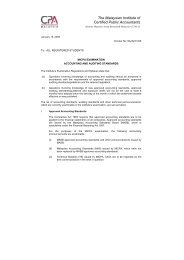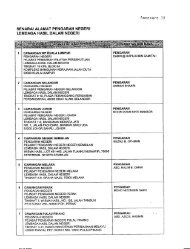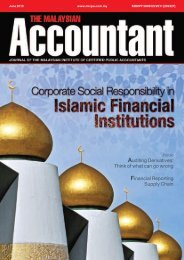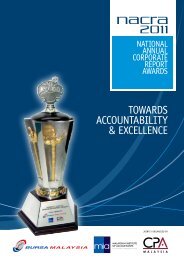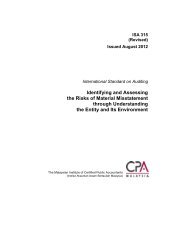The Malaysian Accountant - The Malaysian Institute Of Certified ...
The Malaysian Accountant - The Malaysian Institute Of Certified ...
The Malaysian Accountant - The Malaysian Institute Of Certified ...
Create successful ePaper yourself
Turn your PDF publications into a flip-book with our unique Google optimized e-Paper software.
Commercial undertakings havewithout the authorisation of or anypayment to copyright owners rippedand made available recorded musicfor download.Copyright Act 1987A film is defined to mean the fixation of a sequence ofvisual images on any material so as to be capable by theuse of that material of being shown as a moving picture orof being rerecorded onto some other material. “Fixation”means the embodiment of sounds, images or both or of therepresentation thereof, in a material form sufficientlypermanent or stable to permit them to be perceived,reproduced or otherwise communicated during a period ofmore than transitory duration.“Reproduction” means the making of one or morecopies of work in any form or version and “copy” meansreproduction of a work in written form, in the form of arecording or film, or in any other form. “Infringing copy”in relation to copyright, means any reproduction of anywork eligible for copyright the making of which constitutesan infringement of the copyright in the work or, in the caseof any article imported into Malaysia without the consentof the owner of the copyright, the making of which wascarried out without the consent of the owner of thecopyright. <strong>The</strong>se definitions it is submitted, are broadenough to include the down-loading of a computer file. Itis both a civil and criminal offence if done without the<strong>Malaysian</strong> copyright owner’s consent. <strong>The</strong>se definitions arealso broad enough to protect the copyright of the owners ofthe underlying works that are embodied in the film orsound recording. Th only room for argument is whether thestorage of the film or sound recording and the underlyingworks in a computer or any electronic medium amounts toinfringement. It must be so. Accordingly, sections 13 and 41of the Copyright Act (“Act”) 1987 should be amended todefine an unauthorised act or an infringing copy to include“the reproduction or storage in any material orelectronic form”.It is not clear whether the word “makes” includes theact of downloading. Obviously if the downloadersubsequently burns in hard-copy form a disc of thecopyrighted work for downloading, there would an offence.But what if reproductions are made from direct connectionsto the hard drives of other users logged onto the Internetusing the same software. So as to make the act ofdownloading an offence as well, “downloading or storageof copyright protected work in a computer or on anymedium by electronic or other means that will facilitatedownloading” should be made an act controlled bycopyright. If greater protection were desired, perhaps,downloading or storage of copyrighted work itself if donewithout authorisation would be sufficient to constituteinfringement. <strong>The</strong> purpose for which the downloading orstorage is made is not relevant to found liability.<strong>The</strong> act of uploading however is presently not acriminal copyright infringement. <strong>The</strong>refore, a person who“uploads or stores any work protected by copyright in acomputer or on any medium by electronic or other meanswhether or not for the purpose of making available the workfor subsequent downloading, distribution, dissemination orany further dealings in the work” should be guilty of anoffence. Such an offence can also form the basis for civilinfringement. If adopted in the context of civilinfringement, authorisation is required for any“distribution, dissemination or in any manner dealing inthe work via broadcasting”. “Broadcast” is defined as thetransmitting by wire or wireless means visual images,sounds or other information that is capable of beinglawfully received by members of the public or is transmittedfor presentation to members of the public. It will alsoinclude communication of the work to the public that isalready an offence.In the civil context causing an infringement to takeplace is itself an infringement. However, the act is silent onwhether authorising an infringement is itself aninfringement. To be guilty of authorising an infringement,the defendant must have expressly or implicitlysanctioned, approved or countenanced the infringement.That is pre-conditioned on the defendant having the rightto authorise infringement. It is questionable whether theuploader by offering his files for download may be said tohave authorised infringement. He does not possess theright to authorise in the sense of him having a right to givethe necessary sanction, approval or countenance toinfringe. This is still so, even if he were aware that his P2Ppeers would infringe or is indifferent as to what they mightdo. <strong>The</strong> wrong of authorising infringement is a very narrowone that is ineffective in practical terms. <strong>The</strong> term“causing” an infringement in section 36(1) of the Act,appears capable of a wider application. To “cause” must bea question of fact and circumstances. It is not conditionedupon there having to be a right “to cause” (aninfringement). Rather, it is premised on the degree ofcontrol the uploader has over the creation of and thecomputer containing the uploaded work. He controls themeans, mode and equipment by which infringement iscommitted and allows the downloader infringer access tothese. He in fact is well aware that there would beinfringement and actively encourages such infringing.However, the intent and the ingredients for causinginfringement should be adequately set out in section 36(1)of the Act. Perhaps it should be provided that “for theavoidance of doubt, a person causes another to do an act,the doing of which is controlled by copyright without the6 | <strong>The</strong> <strong>Malaysian</strong> <strong>Accountant</strong> | June/August 2007 www.micpa.com.my


